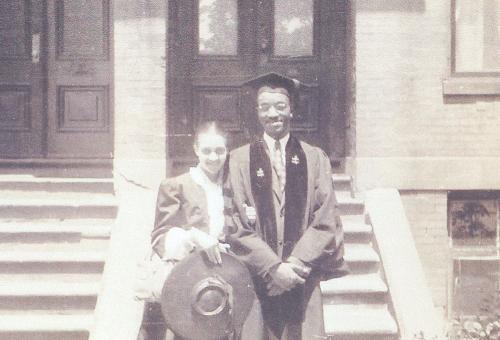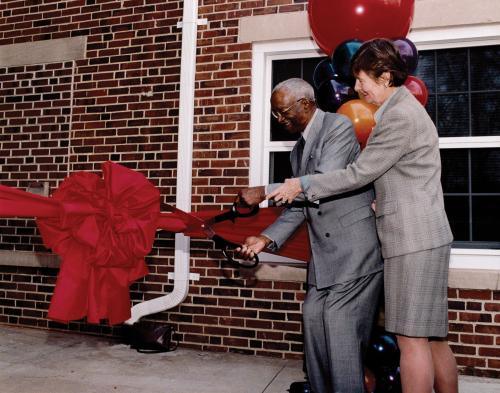

Dr. John Hope Franklin (1915-2009) embraced life and worked with a seriousness and dedication that few could rival. A preeminent scholar, tireless activist and diligent citizen, Dr. Franklin spent his 94 years on earth striving to make a difference.
Franklin was born January 2, 1915, in Rentiesville, Oklahoma. His father, Charles (Buck) Colbert Franklin, was a highly respected and successful lawyer in the Tulsa area, and his mother, Mollie Parker Franklin, was an educator and community builder.
Only 50 years after the abolition of slavery, John Hope Franklin was born into a very color-conscious world. In one of Buck Franklin’s most lauded achievements, he successfully defended the Black survivors of the 1921 Tulsa Race Riots against the City of Tulsa’s attempts to stop Black citizens from rebuilding after the riots. Moments like this surely shaped young John Hope Franklin.
A gifted scholar, Franklin graduated as valedictorian of Tulsa’s Booker T. Washington High School. He went on to follow in his father’s footsteps and study law at Fisk University. Thriving in academia, Franklin continued his education, earning first a master’s degree and then a Ph.D. at Harvard University.

During Franklin’s undergraduate studies at Fisk University, he met Aurelia Whittington. They married on June 11, 1940, in Aurelia’s hometown, Goldsboro, North Carolina. The couple’s only child, John Whittington Franklin, was born August 24, 1952.
Upon graduating from Harvard, Franklin began his teaching career. He held teaching appointments at Fisk University, St. Augustine’s College, North Carolina Central University (formerly the North Carolina College for Negroes), Howard University, Brooklyn College, the University of Chicago, and Duke University.
In early 2001, Duke University opened the John Hope Franklin Center for Interdisciplinary and International Studies. Inspired by Franklin’s example, the John Hope Franklin Center strives to provide a safe, collaborative space to investigate moral and ethical issues. Until his death in 2009, Franklin held an office at the Franklin Center and regularly engaged in scholarly exchanges.

Franklin enjoyed the outdoors and traveled frequently to fly-fish. Another of his passions was horticulture. In his greenhouse in Durham, he nurtured an expansive orchid collection, which featured more than 300 orchids, including Phalaenopsis hybrids named after both John Hope Franklin and his beloved, Aurelia Franklin.
Birth
January 2, 1915 in Rentiesville, Oklahoma
Death
March 25, 2009 in Durham, North Carolina
Education
Harvard University, Fisk University
Occupation
Journalist, Historian
Because of the life John Hope Franklin lived, the public service he rendered and the scholarship that was the mark of his distinguished career, we all have a richer understanding of who we are as Americans and our journey as a people.
—Barack Obama, 44th President of the United States
John Hope Franklin lived for nearly a century and helped define that century. A towering historian, he led the recognition that African-American history and American history are one.
—Dr. Richard Brodhead, 9th President of Duke University
John Hope Franklin was one of the most important American historians of the 20th century and one of the people I most admired…He graced our country with his life, his scholarship and his citizenship.
—Bill Clinton, 42nd President of the United States